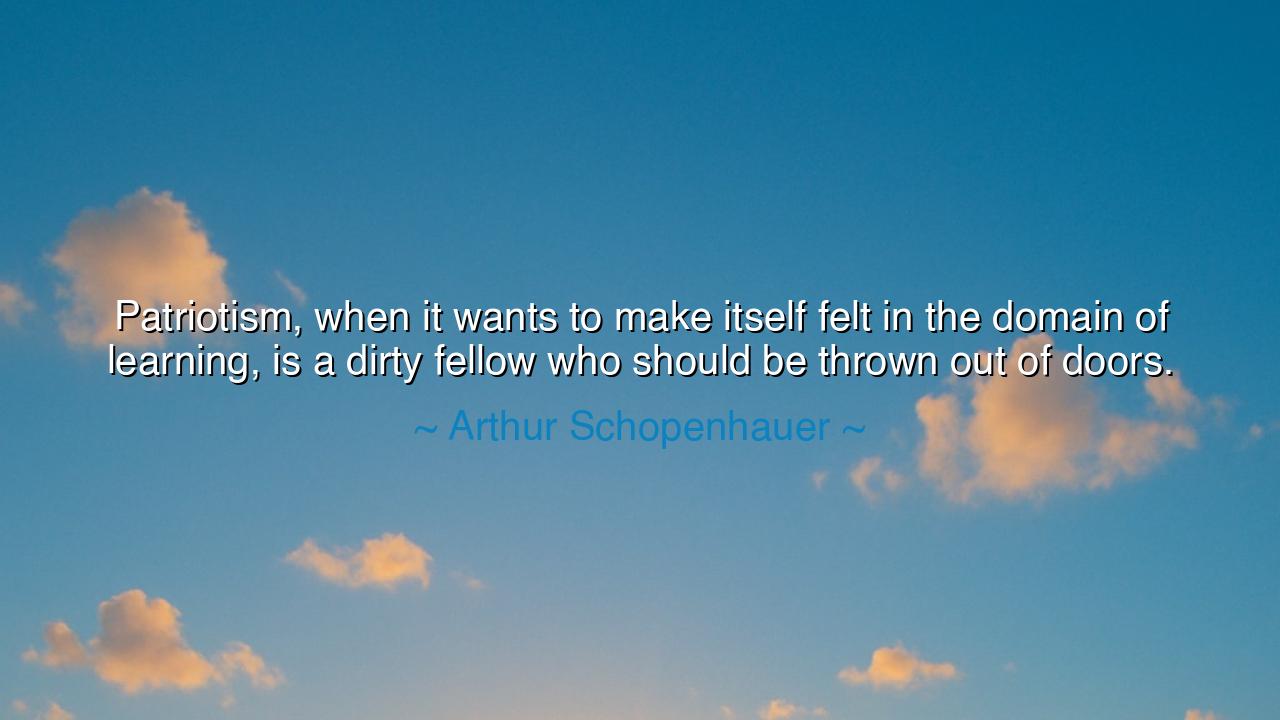
Patriotism, when it wants to make itself felt in the domain of
Patriotism, when it wants to make itself felt in the domain of learning, is a dirty fellow who should be thrown out of doors.






“Patriotism, when it wants to make itself felt in the domain of learning, is a dirty fellow who should be thrown out of doors.” – Arthur Schopenhauer
These words of Arthur Schopenhauer, the stern philosopher of reason and solitude, strike like a lightning bolt across the centuries. His declaration is not a rejection of love for one’s homeland, but a defense of something higher — the purity of truth, the sanctity of learning, and the freedom of the human mind from the chains of pride and prejudice. He warns that when patriotism, that fierce loyalty to nation and tribe, intrudes upon the realm of knowledge, it becomes corrupting, defiling the sacred temple of wisdom with bias, arrogance, and deceit. For the pursuit of learning demands humility before truth — and truth knows no flag.
The origin of this quote rests in Schopenhauer’s own time, an age of feverish nationalism in 19th-century Europe. Nations, eager to proclaim their superiority, began to claim their own philosophers, scientists, and artists as proof of greatness — not as servants of truth, but as trophies of pride. Schopenhauer, who valued the universality of knowledge above all, saw this as a sickness of the intellect. To him, knowledge belonged not to Germany, or France, or England, but to the world. It was the property of reason itself, the inheritance of all mankind. Thus, he wrote with scorn that patriotism, when it enters the halls of learning, is like a “dirty fellow” — an uninvited guest who stains the robes of wisdom with vanity and ignorance.
For Schopenhauer, learning was a sacred act — the meeting of the human spirit with the eternal. It could not tolerate lies, nor bow to the idols of tribe or nation. When patriotism dares to intrude upon it, it demands that truth serve loyalty rather than reality. It whispers that one’s country is always right, that one’s culture is always superior, that one’s scholars and history are the greatest. And so, the philosopher declared that such an impulse must be thrown out of doors — cast out, as one would remove filth from a sanctuary. For knowledge can never serve truth and pride at once.
History has shown the peril of ignoring this warning. In the 20th century, entire regimes sought to twist science, history, and philosophy into weapons of nationalist ideology. The Nazis, for example, perverted biology and anthropology into instruments of racial propaganda, claiming that falsehood was truth because it glorified the nation. The result was not enlightenment but destruction — the burning of books, the silencing of minds, the shattering of humanity’s moral compass. Schopenhauer’s warning rings clear across time: when patriotism corrupts learning, knowledge ceases to be a light and becomes a torch that burns.
And yet, his words also hold a subtler wisdom. For Schopenhauer did not condemn patriotism itself — only its intrusion where it does not belong. Love of one’s homeland, when humble and sincere, can inspire service, compassion, and unity. But when that love seeks to dominate the realm of truth, it becomes tyranny. The wise must learn to keep the two apart: the heart may love one’s nation, but the mind must remain loyal to truth alone. For truth is the homeland of all souls; it is the soil from which all nations grow, and to which all wisdom returns.
There is a story of Galileo Galilei, who dared to proclaim that the Earth moved around the Sun, defying both Church and state. He was condemned not because he was wrong, but because his discovery threatened the pride of his age. His learning was branded heresy because it contradicted the “patriotic” image of divine perfection that Italy and Christendom held dear. Yet centuries later, his truth stands unbroken, while the power that silenced him has long crumbled to dust. From this we learn: truth endures; pride decays.
Thus, children of knowledge, remember Schopenhauer’s commandment: guard the purity of learning. When studying history, do not ask, “How does this glorify my people?” but “What does this teach all people?” When reading philosophy or science, do not seek to prove that your nation is the wisest or strongest — seek only to understand what is real. The patriot who loves truth honors his country more than the one who flatters it with lies.
For in the end, all nations pass away, all empires fall, but truth remains. And the mind that serves truth serves all mankind. So when patriotism comes knocking at the door of learning — loud, proud, and unwashed — do as Schopenhauer commands: throw it out. Keep the house of wisdom clean, that it may continue to shine as a lamp for every generation, beyond borders, beyond pride, and beyond time itself.






AAdministratorAdministrator
Welcome, honored guests. Please leave a comment, we will respond soon